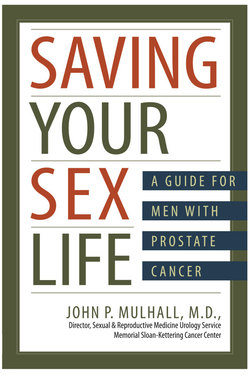Читать книгу Saving Your Sex Life: A Guide for Men With Prostate Cancer - John P. Mulhall - Страница 12
На сайте Литреса книга снята с продажи.
V. How Libido Works
ОглавлениеLibido is yet another brain event. (The brain is the biggest sex organ after all!) The most important factor for libido in men is the presence of testosterone. This is also somewhat true for women and may be a reason as to why women lose their sex drive after menopause. The next chapter deals with testosterone in far greater detail, but in the absence of testosterone, there is a significant reduction in sex drive.There are other factors,of course, which impact upon this. There are some men, for example, who have perfectly normal testosterone levels who constitutionally have a low sex drive. Whether this is related to prior sexual experiences or cultural factors is not well defined. How much testosterone is actually needed for sex drive is not well understood, but if a man over the course of his third, fourth and fifth decades of life has a significant reduction in his testosterone level, this will manifest in a variety of ways, one of which is low sex drive.
Saying this, the majority of men reporting low sex drive do not, in fact, have low testosterone, but have psychological reasons for this. A testosterone level is easy to check. It is an early morning blood test for which a man does not need to fast. It is generally recommended that the blood work be performed as early as possible in the morning, but certainly before 10 o’clock. The reason for this is that there is a circadian rhythm of testosterone production, with the levels being highest in the morning and lowest in the late afternoon.
Any external stressor or psychological disorder (such as depression and anxiety) and certain medications, in particular those that interfere with testosterone and those that have an impact upon the brain (for example, those used for depression and psychotic disorders), can negatively impact a man’s sex drive. In the general population, one of the most common reasons for loss of sex drive is, in fact, erectile dysfunction. It is very common for men who have erection problems over the course of time to lose their sex drive. This is explained very simply through avoidance behavior. Men do not like to pursue activities at which they fail, and when a man fails to get an erection that satisfies him and his partner, he will avoid sexual scenarios. For many men that includes intimacy activities, such as kissing, cuddling and hugging, because there is a concern for men that these activities will lead to sexual relations, which is an anxiety-inducing event for men with erectile dysfunction. Thus, when a man presents with low sex drive, the routine response from the physician should be to have an early morning testosterone level checked. If this is normal, then it is safe to presume that the man’s libido problems are psychologically based, and the decision should be made whether that patient should be seeing a psychologist or if there is an obvious reason that can be corrected by the physician. If the testosterone level is low, then a comprehensive discussion should be held with the patient regarding the pros and cons, risks and benefits of testosterone supplementation. In the patient with a diagnosis of prostate cancer, this is an extremely complicated discussion. See Chapter 15 for a detailed discussion of this.
